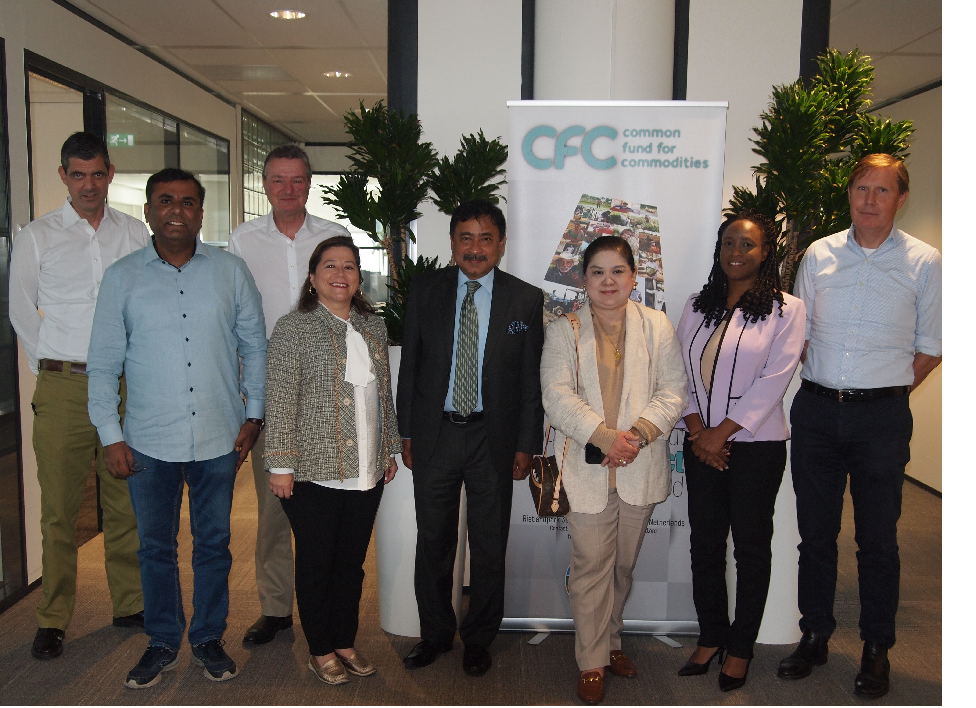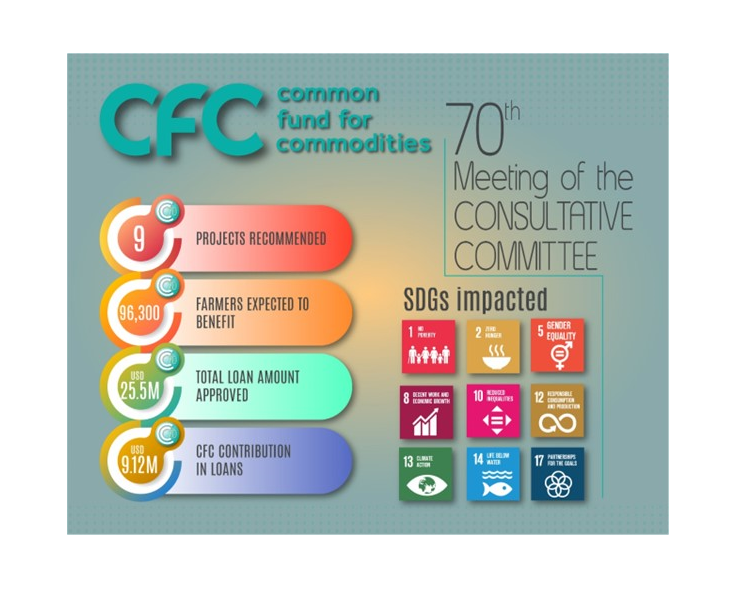70th Meeting of the Consultative Meeting approved a record nine projects for CFC
The Common Fund for Commodities (CFC) held its 70th Meeting of the Consultative Committee (CC) in hybrid format from its headquarters in Amsterdam, Netherlands, from 27 to 30 June 2022. This was an opportunity for some CC members to reunite in person since the pandemic struck in March 2020, imposing a series of virtual meetings.
The CC reviewed nine projects submitted under the 20th Call for Proposals. Upon thorough assessment of their viability and potential for long-term development impact, the Committee recommended all projects for further consideration and approval by the CFC’s Executive Board (EB).
The total value of these projects amounts to USD 25,495,000, including USD 9,117,000 of CFC contribution under the form of loans. These projects are based in Colombia, Côte d’Ivoire, Ghana, Indonesia, Nicaragua, Peru, Thailand, Uganda (LDC), Zimbabwe. They cover a variety of commodities, including rice, soybeans, oilseeds, fruits, spices, groundnuts, coffee, used cooking oil (UCO), land mapping and titling.
As an impact investment fund, the CFC is committed to achieving impact following the SDG framework. As such, the recommended projects target the CFC’s core SDGs – SDG 1 (No Poverty), SDG 2 (Zero Hunger), SDG 5 (Gender Equality), SDG 8 (Decent Work and Economic Growth), SDG 10 (Reduced Inequalities), SDG 13 (Climate Action) – as well as SDG 12 (Sustainable Consumption and Production), SDG 14 (Life Below Water), SDG 17 (Partnerships for the Goals). Specifically, they are expected to benefit 96,300 farmers, providing them with training, increased incomes and livelihoods.
 Ambassador Sheikh Mohammed Belal, Managing Director of the CFC, in his opening statement, highlighted how COVID-19 and the war in Ukraine has brought a new level of inequalities in the commodity producing developing countries. These inequalities also pushed millions of smallholders and SMEs into a level of hardships not anticipated before. Ambassador Belal further elaborated on how CFC, with its limited resources, have been trying its best trying to provide the support for the sustained operations of agricultural value chains. As such, we have been quickly implementing new projects and have received more and quality project proposals during the last Open Call.
Ambassador Sheikh Mohammed Belal, Managing Director of the CFC, in his opening statement, highlighted how COVID-19 and the war in Ukraine has brought a new level of inequalities in the commodity producing developing countries. These inequalities also pushed millions of smallholders and SMEs into a level of hardships not anticipated before. Ambassador Belal further elaborated on how CFC, with its limited resources, have been trying its best trying to provide the support for the sustained operations of agricultural value chains. As such, we have been quickly implementing new projects and have received more and quality project proposals during the last Open Call.
Amb. Belal also updated the CC members on some highlights of CFC activities since the last meeting. He shared how our Governing Council has approved the addition of SDG 13 (Climate Action) among our score SDGs, as well as our participation in meetings and events from relevant global development players, reflecting consistent endeavors to strengthen agricultural value chains. Amb. Belal also focused on the progress on the creation of the Commodity Impact Investing Facility (CIIF), a new instrument to attract impact investors to finance the projects identified and managed by the CFC. The final report of the Working groups on Sustainable Fund Management was approved by the Governing Council at its 33rd Meeting in December 2021, which authorized the Managing Director to take the necessary steps to establish the CIIF.
Beyond reviewing projects, the CC also discussed other operations of the CFC such as the project pipeline, Impact Portfolio Management, Loan Portfolio Management, and an update on the CIIF.
The Consultative Committee expressed their satisfaction and appreciation at the, in their words, successive improvements in the quality of the projects and their presentations by the CFC. They, however, wish to see CFC consider scaling up some of its highly successful projects in the qualifying member countries.
In light of the pressing global challenges, the 70th session meeting of the Consultative Committee can be considered a success. Not only this session approved a record nine projects involving an investment of 25.5 million USD, but it also expands its geographical reach as well as diversity in the composition of the commodity mix in the portfolio. CFC, however, look forward to increasing the size of both of its investment and geographical reach by integrating international collaboration, expertise and innovations. We are convinced that without technological transformation, the contour of poverty in the developing world shall remain far from achieving sustainability within the agreed timeline of 2030.
The CC is composed of nine independent experts in a specific commodity or subject matter area, and is an advisory body for the Executive Board of the CFC. Members of the CC provide the CFC with their expertise to identify best projects to be recommended to the Executive Board. The CC is composed of five women and four men, hence reflecting the CFC’s commitment to gender equality. The meeting was chaired by Ms. Jie Chen for the fourth time.

